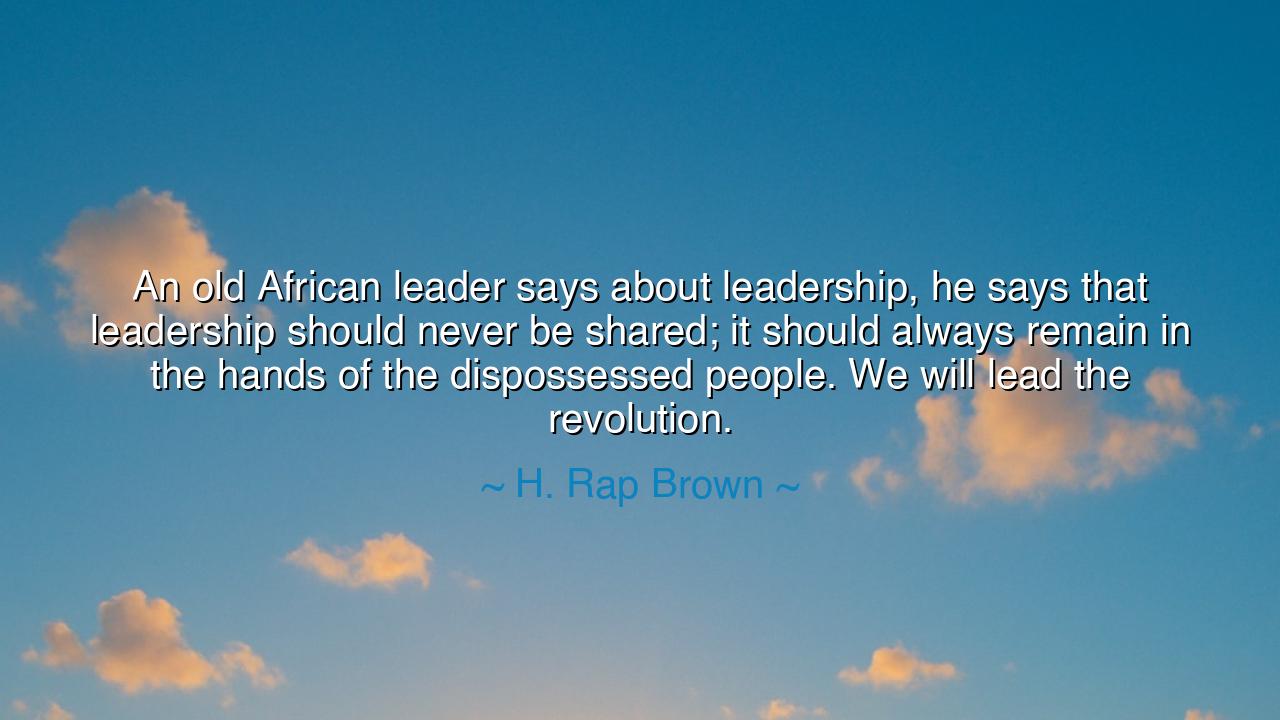
An old African leader says about leadership, he says that
An old African leader says about leadership, he says that leadership should never be shared; it should always remain in the hands of the dispossessed people. We will lead the revolution.






The words of H. Rap Brown — “An old African leader says about leadership, he says that leadership should never be shared; it should always remain in the hands of the dispossessed people. We will lead the revolution” — burn with the fire of struggle and prophecy. They arise from the soul of a people who have known chains, silence, and betrayal — yet who still dare to claim the right to lead themselves. In this declaration lies not arrogance, but reclamation: the belief that true leadership must rise from those who have suffered the weight of injustice, for only they know the hunger for liberation that drives the spirit beyond fear. Brown’s words echo across centuries of resistance — a cry from the oppressed to take the reins of destiny into their own hands.
In the ancient world, the philosophers spoke of justice as a balance — yet history shows that those who possess power rarely seek balance. Power, once taken, clings to itself. The dispossessed, those cast aside by empire and greed, are the ones who feel the pulse of truth most keenly. For they live close to the earth, close to hunger, close to the raw essence of life. When Brown speaks of keeping leadership “in the hands of the dispossessed,” he is invoking an ancient principle: that the heart of revolution must not be governed by those who already feast at the table, but by those who have starved beside it. Only the oppressed can lead the march toward freedom, because only they remember what freedom costs.
Consider the story of Toussaint Louverture, the son of slaves who rose to lead the Haitian Revolution — the only successful slave uprising in history. Against the might of France, Spain, and Britain, he forged an army of the poor and enslaved, teaching them discipline, courage, and unity. His leadership did not come from privilege or wealth; it came from pain transmuted into power. Like Brown’s vision, Toussaint’s revolution was not directed by the comfortable or the elite, but by those who had nothing to lose but their chains. The dispossessed led, and through their leadership, they changed the course of the world.
Brown’s words also speak to a deeper spiritual truth: the moral authority of the oppressed. In every generation, those who have been silenced hold within them a clarity that the privileged cannot possess. For suffering, when borne with purpose, refines the soul. It strips away illusion and exposes the essence of what is right. The dispossessed, therefore, are not simply victims — they are keepers of the world’s conscience. To place leadership in their hands is not an act of vengeance; it is an act of restoration. It returns to humanity the vision of justice uncorrupted by comfort or greed.
Yet the path of such leadership is never easy. The revolution that Brown speaks of is not only political, but spiritual — a revolution of values, of truth, of courage. The dispossessed must lead not through bitterness, but through the fierce purity of purpose that comes from knowing what it means to be dehumanized and yet still human. Like Nelson Mandela, who emerged from twenty-seven years in prison not with hatred, but with wisdom, those who rise from oppression must lead with both fury and forgiveness, strength and vision. For only then can revolution build instead of destroy, heal instead of divide.
In the modern world, Brown’s warning still resounds. Too often, movements for justice are overtaken by those who seek prestige rather than progress. When leadership passes from the hands of the poor to the hands of the powerful, the revolution becomes a performance. Its fire cools. Its vision blurs. That is why Brown insists that leadership must remain with the dispossessed — not because they are perfect, but because they are real. They have known what it means to bleed for change, and thus they guard its flame with their lives.
The lesson, then, is timeless: the soul of leadership is born in struggle, not comfort. To lead rightly, one must carry the scars of the people one serves. Let every generation remember this truth — that greatness does not descend from palaces, but rises from prisons and battlefields, from fields worked by calloused hands, from the cries of mothers and the dreams of the poor. The dispossessed must not wait for salvation from above; they must become the architects of their own deliverance.
Therefore, let us heed Brown’s call. Let the dispossessed lead the revolution — not only in politics, but in every domain where injustice reigns: in hearts hardened by apathy, in systems built on greed, in minds chained by fear. For when those who have suffered most take up the mantle of leadership with courage and wisdom, the world moves closer to its redemption. And in that day, leadership will no longer be the privilege of the few, but the triumph of the many — a living testament that from the ashes of oppression, true power can rise, pure and unbroken.






AAdministratorAdministrator
Welcome, honored guests. Please leave a comment, we will respond soon